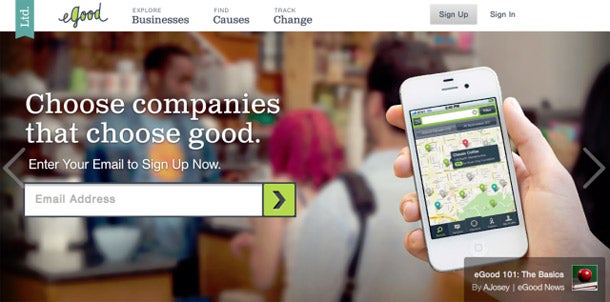3 Quirky, Innovative Startups From TechCrunch Disrupt
Opinions expressed by Entrepreneur contributors are their own.
Hundreds of ambitious tech startups from across the globe descended upon San Francisco this week for TechCrunch Disrupt, scrambling to stand out from the crowd and snag some serious investor cash. A handful of outliers did indeed manage to make their mark, stirring up some positive buzz about their quirky, innovative niche products.
Here’s a look at three nascent tech companies that we expect to hear a lot more about soon:
1. eGood
A mobile payment and customer-loyalty app with a charitable twist.

Officially chosen by TechCrunch as “one of the top startups to emerge out of Startup Alley” this week, eGood has created a slick-looking in-store check-in and loyalty app that lets users donate to local and national charities while paying for goods and services at local businesses.
The Glendora, Calif.-based startup benefits participating store owners by boosting their exposure to consumers who want to support charitable causes. Merchants using eGood donate up to 5 percent of each customer purchase to the charity or nonprofit of their choice.
eGood’s digital customer loyalty solution (adios printed customer rewards card) automatically tracks patron visits and amounts spent.
Most of the businesses currently using eGood are neighborhood coffee shops and restaurants. The company will reportedly use $3 million in recently received seed money to grow its presence throughout Southern California.
Related: A Look at the Long, Contentious Road to Buying Dell Inc.
2. Displair
A floating 3-D, interactive video screen made of thin air and vapor.

Imagine a full-color, translucent video screen floating in thin air that you can control with a swipe of your hand. That’s what the developers of Russia-based startup Displair did two years ago. And then they made it a reality, while still in college, mind you.
Displair works like this: First, a stream of cold, dry fog is emitted from the device, which somewhat resembles a printer. Images are then projected onto the fine mist and an infrared camera detects hand gestures, including palm and even finger swipes. You could, if you felt so moved, watch a video of a globe on the Displair, and then spin it. Or you could use it to be a real-life fruit ninja and slice video images of fruit.
The startup is in the market for investors to back commercial production of its product. With a price tag of $2,500 for a one-day rental and $25,000 to purchase, investors might not appear out of thin air any time soon, though.
Related: How 3-D Printing Startups Are Shaping the Future
3. Diveboard
A social media and e-commerce platform for divers and dive shop owners.

Launched about a year ago, Diveboard‘s free, multi-platform (web, iPhone, Android) social media and e-commerce service lets diving enthusiasts easily record and share their diving memories. Users can make their own profiles and upload details of their dives, along with photos and videos. They can also review dive shops.
More than 10,000 divers currently use Diveboard and some 80,000 dives have been logged using the service to date. Some notable Diveboard features include: access to an impressive database of more than 2 million species of sea life, a database of nearly 50,000 diving spots throughout the world and integration with Twitter, Flickr and Facebook’s sharing features.
Diveboard makes money by charging premiums to dive shop members who use the e-commerce portion of the service, which lets them create online shops using a basic widget that they can embed within their main company website.
Related: Web Startup Scores $28 Million to Simplify A/B Testing
Hundreds of ambitious tech startups from across the globe descended upon San Francisco this week for TechCrunch Disrupt, scrambling to stand out from the crowd and snag some serious investor cash. A handful of outliers did indeed manage to make their mark, stirring up some positive buzz about their quirky, innovative niche products.
Here’s a look at three nascent tech companies that we expect to hear a lot more about soon:





